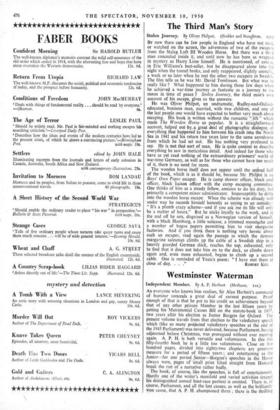The Third Man's Story
Stolen Journey. By Oliver Philpot. (Hodder and Stoughton. ifs.) BY now there can be few people in England who have not read, or watched on the screen, the adventures of two of the escapers from the Stalag Luft III Wooden Horse. But there was a third man concealed inside it, and until now he has been as wrapped in mystery as Harry Lime himself. He is mentioned, of course, in Eric Williams's best-seller, but he disappeared alone into the night when the tunnel broke, and only reappeared, slightly unreall, a week or so later when he met the other two escapers in Sweden. The film tells us he was Mr. David Tomlinson. But what was he really like ? What happened to him during those few days when he achieved a war-time journey as fantastic as a journey to the moon in tithe of peace ? Stolen Journey, the third man's own account of his escape, gives us the answers.
He was Oliver Philpot, an undramatic, Radley-and-Oxford- educated, business man, married, with two children, and one of the last people one would have expected to bother very much about escaping. His book is written without the romantic '.lift" which made The Wooden Horse so popular. It is a straightforward account, helped out-.by,,a great _deal of photographic dialogue, of everything that haPpened to him between his crash into the North Sea in 1941 and his return two years later to the same aerodrome from which he had set out. He has nothing very profound to say. He is not that sort of man. He is quite content to describe everything he saw in meticulous detail. And indeed for those who have as yet read nothing of the extraordinary prisoners' world of war-time Germany, as well as for those who cannot have too much of it, there is no need for more.
The wooden horse itself does not appear until the send half -of the book, which is as it should be, because Mr. Philot is no Boys' Own Paper escaper. He is camp shower officer, block coal officer, block liaison officer with the camp escaping committee. One thinks of him as a steady fellow, anxious to do his duty, but primarily a competent minor administrator. Imperceptibly he drifts into the wooden horse escape. When the scheme was already well under way he records himself honestly as saying to an outsider: "It's a plumb crazy scheme—and if you ask me its life will only be a matter of hours." But he sticks loyally to the work, and in the end off he sets, disguised as a Norwegian version of himself, with a black Homburg, a little suitcase, a trimmed moustiche and a number of bogus papers permitting him to visit margarine factories. And if you think there is nothing very heroic about such an escaper, read again the passage in which the demure margarine salesman climbs yp the cable of a Swedish ship in a heavily guarded German dock, reaches the top, exhausted, only to find that it does not take him on to the deck, so climbs down again and, even more exhausted, begins to climb up a second cable. One is reminded of Yeats's poem: "I have met them at close of day. . . ." ROBERT KEE.


















































 Previous page
Previous page